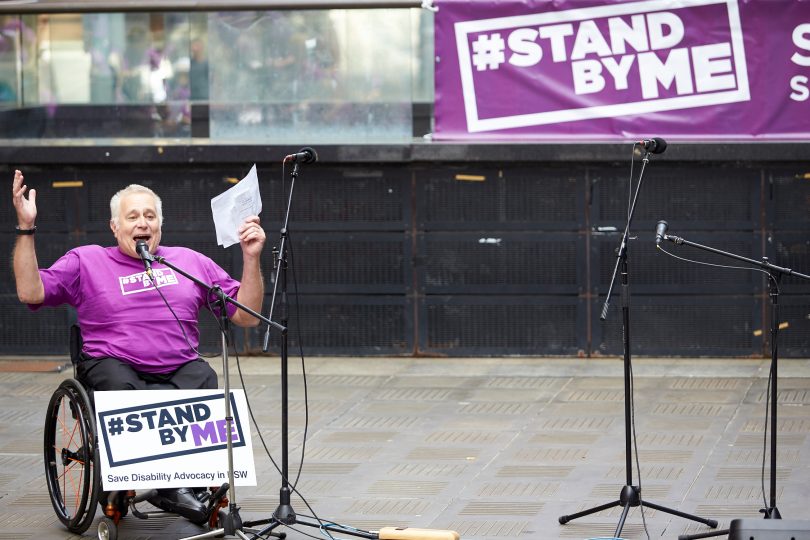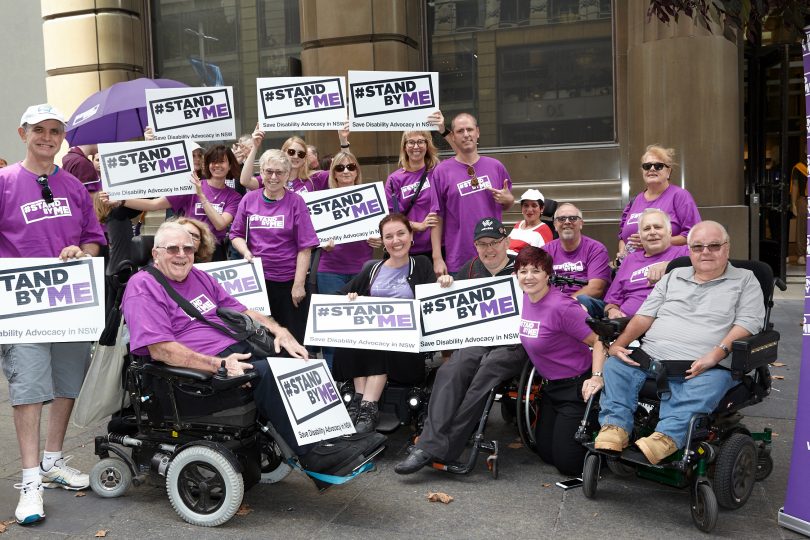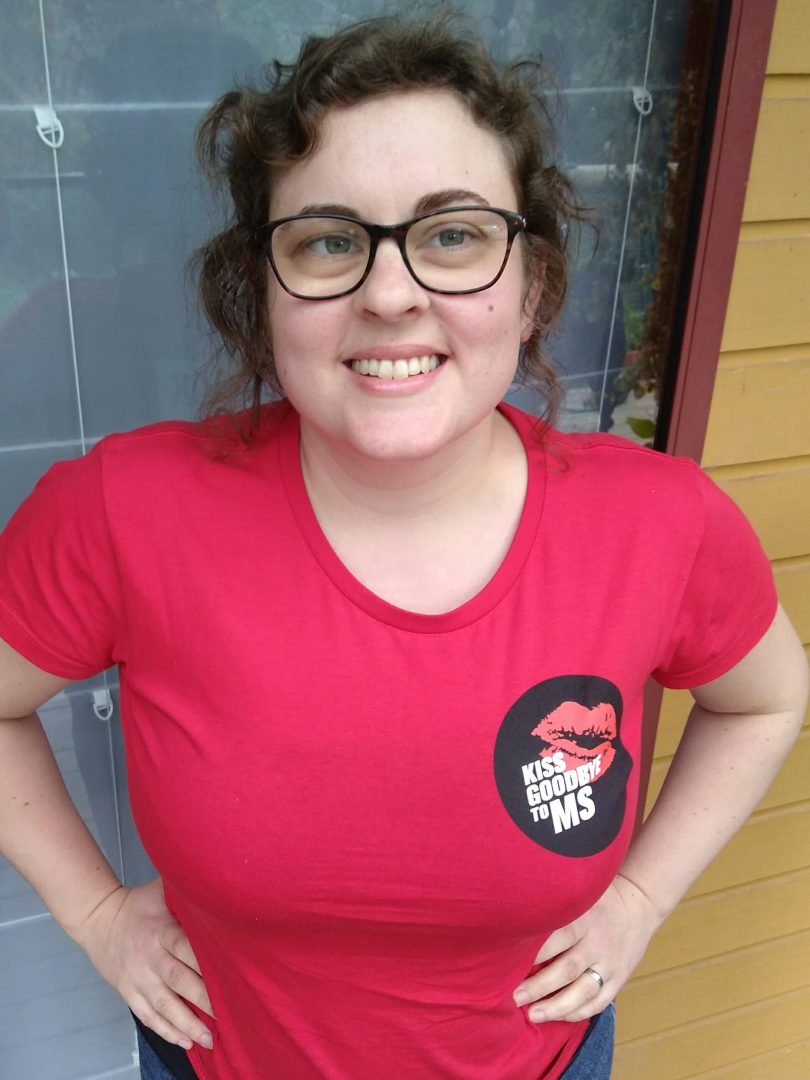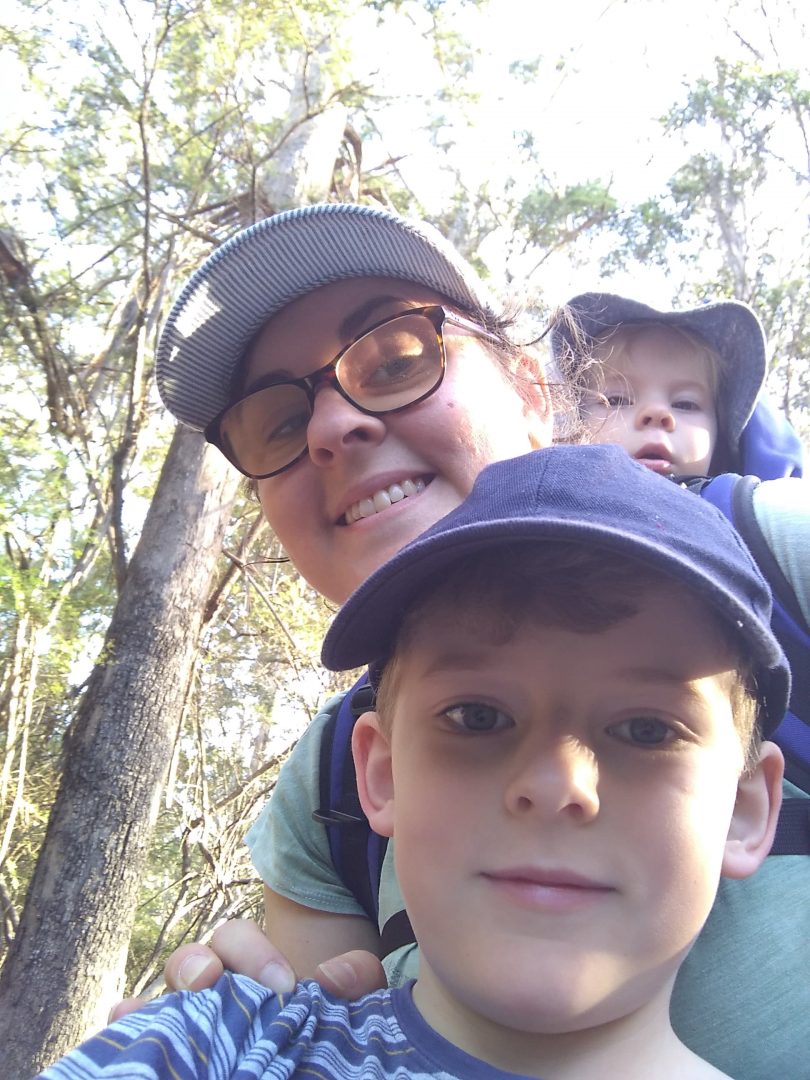
Kalaru local Chris Sparks at the NSW DAA #Stand By Me Rally for Disability Advocacy Funding in Martin Place, Sydney, in February this year. Photo: supplied.
Kalaru local Chris Sparks has had a busy few months in his role as President of Sydney-based disability advocacy agency The Physical Disability Council of NSW [PDCN]. The body’s funding of about $260,000 per year is not guaranteed after June 2020, and Sparks has been looking to shift that.
“Unless something changes, you will see advocacy organisations like ours closing their doors next year,” he says “and without people kicking the door, change comes slowly.”
Members of the PDCN Board, including Sparks, have met with the new NSW Minister for Families, Communities and Disability Services Gareth Ward on several occasions over the past few weeks.
The Minister made it clear that as a person with a disability himself he is very keen to hear from people who are worried about the imminent loss of disability advocacy funding to PDCN and other organisations.
He suggested that people who are concerned about the loss of vital funding to PDCN should write to their local MP.
Without the easily accessible well of people with lived experience of different disabilities, the government would have to hire a consultancy agency to assemble a panel of disability advisors.
“At $260,000 a year, our organisation and other disability advocacy agencies running on similar budgets are the cheapest consultancies the government will ever find!” Sparks says drily.

NSW DAA #Stand By Me Rally for Disability Advocacy Funding in Martin Place, Sydney in February 2019. Photo: supplied.
So aside from advising the government about public accessibility issues, what do disability advocates do?
Sparks says while PDCN does go in to bat for individuals if necessary, their primary aim is to address systemic problems for people with disabilities.
“Having said that though, individual approaches are very important, because without someone raising it, how do we know about systemic issues?”
Keenly aware that living with his particular disability doesn’t mean he understands someone else’s experience of disability, Sparks has a few stories to tell to illustrate this point.
“Earlier this year, I helped organise the ATSA Independent Living Expo in Sydney,” he says
“It’s a huge event, with about 3,000 people and it showcases all kinds of mobility devices and other technology to assist people with disabilities.
“During this year’s event, I had two different sets of parents of adult children with disabilities approach me and complain that we hadn’t provided a changing place.”
A changing place is a large bathroom with a hoist and sling which assists in the changing of adult diapers.
After realizing that one set of parents, in their 70’s, had dragged their adult son onto the floor of the disabled bathroom to change him and then back into his wheelchair unassisted, while the other set of parents had taken their full-grown daughter out to the boot of their car to change her, Sparks says he was “mortified”.
“I looked at them and I realized they’d done this thousands of times,” he says “the only difference was that this event was for the disabled so it was especially rough that we hadn’t provided a changing place.”
Vowing to never again hold the event without proper facilities, Sparks and his colleagues did what they hope everyone would do in that situation – listen and act.
Tathra’s Sophie Crouch-Revington is a good example of the people disability advocacy groups support.
With a recent diagnosis of Multiple Sclerosis [MS], which affects the central nervous system, Sophie has two young children, a pending request with the NDIS and no idea what the future holds in terms of her mobility.
“I’ve had two big flare-ups since I was diagnosed last year,” Sophie explains “and each time, I looked at the world differently, taking note of obstacles in public places that I’d never noticed before.”

Sophie Crouch-Revington, of Tathra, was diagnosed with MS at the age of 34 and says she has had to make some big identity changes as a result. Photo: supplied.
“Even our house presented problems – the steps leading down to the house were difficult to navigate during my second flare-up, which affected my legs more.”
With fatigue one of the biggest invisible symptoms of MS, Sophie doesn’t have much time or energy to advocate for the things she needs during her flare-ups, like a rail for the shower and help with childcare and housework.
“The first flare-up affected my whole left arm and hand, so I couldn’t change my two-year-old son’s nappies,” she says, laughing drily “I literally needed a helping hand.”
Sophie’s primary goal is to make sure her illness doesn’t affect her two boys, aged five and two.

Sophie with Will, foreground and Hamish, in a backpack. Photo: supplied.
“My diagnosis has made me realize how much disability funding is a community issue. Because although my kids aren’t disabled, my illness affects their inclusion when I can’t take them out as much, when we can’t go to the park or to social events.”
Sophie and her family are currently managing day-to-day but Sophie says she often wonders “what happens if I don’t get accepted to the NDIS and things get worse?”
If that does happen, and if funding to disability advocacy organisations is cut in 2020, Sophie and others in similar situations won’t have many places to go to for help.
“If funding is cut, these organizations won’t be coming back,” Sparks says “we just can’t do it with no money at all, we’re barely managing on the budget we have.”
Whilst Minister Ward has not given any commitment to continued funding after June 2020, the PDCN says he will continue to meet with them to work on the issue.
The PDCN is encouraging people who have concerns to write to their local MP or request a meeting.
In the meantime, Sophie Crouch Revington is taking part in ‘The May 50km’, a fundraising walk for MS research. To show your support visit her donations page.
#Region Media will be seeking comment from the NSW Minister for Families, Communities and Disability Services Gareth Ward.







